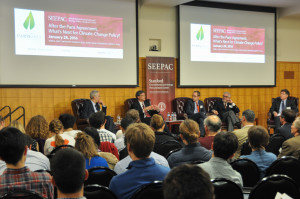The Stanford Environmental and Energy Policy Analysis Center (SEEPAC), Stanford Institute for Economic Policy Research (SIEPR) and the Precourt Institute for Energy discussed how effective the Paris Agreement on climate change will be, and the future of climate policy, during a panel discussion on Jan. 28.
Under the Paris Agreement, negotiated last December at the 2015 U.N. Conference on Climate Change, 195 countries pledged to keep further global warming below two degrees Celsius. Unlike the previous Kyoto Protocol, the Paris treaty secured participation from both developed and developing countries.
Todd Stern, the U.S. Special Envoy for Climate Change and chief negotiator on climate issues, viewed the agreement in Paris as a major victory for establishing a universal climate agreement that applies to almost all countries.
“The agreement revises the basic framework of climate change [policy], and this framework looks forward and not backwards,” Stern said.

However, some believe that talks in Paris have come too late. Jerry Taylor, president of the Niskanen Institute, a libertarian think tank, expressed concern that the agreement will not successfully maintain an average temperature rise below two degrees Celsius.
“The national commitments made in Paris are utterly inadequate for that task,” Taylor said.
According to Taylor, the Intended Nationally Determined Contributions (INDC) that each member country of the Paris Agreement has pledged to take by 2020 will only limit global warming to three to five degrees celsius if followed through with.
“I think the Paris agreement is the first step that we needed decades ago,” said Sophie Harrison ’16 before she attended the panel.
However, some worried that national policy will not be stringent enough to help meet emissions reduction goals. The U.S.’s Clean Power Plan, which sets emissions standards for power generation until 2030, may not demand sufficient cuts in greenhouse gasses from utilities, according to Taylor.
Trevor Houser, a partner at the public policy research firm Rhodium Group, said that significant reductions must come from voluntary state action, including the adoption of more ambitious policies. He cited California as an example, highlighting the state’s more stringent guidelines for reducing pollution.
California Secretary for Environmental Protection Matthew Rodriguez rejected the common criticism that more stringent climate regulations harm the economy by excessively burdening companies.
“[California has] a good economic story in addition to promoting good climate policy,” Rodriguez said, pointing out that California’s economy grew after the recession despite the strong environmental measures contained in the Global Warming Solutions Act of 2006, which requires the reduction of statewide emissions to 1990 levels by 2020.
According to Taylor, the business world is not standing idle in light of the agreement. Some companies, such as Salesforce and Nike, have pledged to use only energy developed from renewable sources. Even oil companies are preparing for a future with stronger regulation.
“Shadow pricing of carbon has been changing things behind the scene,” Taylor said, referring to policy shifts among energy companies.
According to Taylor, Exxon-Mobil uses a tax of $60 per ton of carbon internally when evaluating the profitability of new ventures.
There was a general consensus at the panel that the Paris Agreement has created a framework for more positive movement in addressing climate change.
“I think the major step forward from Paris was success in having very broad participation by the countries of the world in the effort to reduce greenhouse gases,” said Lawrence Goulder Ph.D. ’82, professor of environmental and resource economics.
“There’s no assurance that nations will fulfill their pledges, and the pledges themselves are probably weaker than what’s needed to avoid very serious climate impacts,” Goulder added in a statement to the Daily. “But still it’s very significant and encouraging that virtually all of the countries of the world are working together toward common objective.”
Contact Regan Pecjak at reganp ‘at’ stanford.edu.
